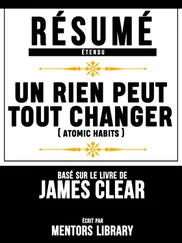Similarly, El Guerrouj might be one of the best runners in history, but it’s doubtful he would ever qualify for the Olympics as a swimmer. Since 1976, the average height of Olympic gold medalists in the men’s 1,500-meter run is five feet, ten inches. In comparison, the average height of Olympic gold medalists in the men’s 100-meter freestyle swim is six feet, four inches. Swimmers tend to be tall and have long backs and arms, which are ideal for pulling through the water. El Guerrouj would be at a severe disadvantage before he ever touched the pool.
The secret to maximizing your odds of success is to choose the right field of competition. This is just as true with habit change as it is with sports and business. Habits are easier to perform, and more satisfying to stick with, when they align with your natural inclinations and abilities. Like Michael Phelps in the pool or Hicham El Guerrouj on the track, you want to play a game where the odds are in your favor.
Embracing this strategy requires the acceptance of the simple truth that people are born with different abilities. Some people don’t like to discuss this fact. On the surface, your genes seem to be fixed, and it’s no fun to talk about things you cannot control. Plus, phrases like biological determinism makes it sound like certain individuals are destined for success and others doomed to failure. But this is a shortsighted view of the influence of genes on behavior.
The strength of genetics is also their weakness. Genes cannot be easily changed, which means they provide a powerful advantage in favorable circumstances and a serious disadvantage in unfavorable circumstances. If you want to dunk a basketball, being seven feet tall is very useful. If you want to perform a gymnastics routine, being seven feet tall is a great hindrance. Our environment determines the suitability of our genes and the utility of our natural talents. When our environment changes, so do the qualities that determine success.
This is true not just for physical characteristics but for mental ones as well. I’m smart if you ask me about habits and human behavior; not so much when it comes to knitting, rocket propulsion, or guitar chords. Competence is highly dependent on context.
The people at the top of any competitive field are not only well trained, they are also well suited to the task. And this is why, if you want to be truly great, selecting the right place to focus is crucial.
In short: genes do not determine your destiny. They determine your areas of opportunity. As physician Gabor Mate notes, “Genes can predispose, but they don’t predetermine.” The areas where you are genetically predisposed to success are the areas where habits are more likely to be satisfying. The key is to direct your effort toward areas that both excite you and match your natural skills, to align your ambition with your ability.
The obvious question is, “How do I figure out where the odds are in my favor? How do I identify the opportunities and habits that are right for me?” The first place we will look for an answer is by understanding your personality.
HOW YOUR PERSONALITY INFLUENCES YOUR HABITS
Your genes are operating beneath the surface of every habit. Indeed, beneath the surface of every behavior . Genes have been shown to influence everything from the number of hours you spend watching television to your likelihood to marry or divorce to your tendency to get addicted to drugs, alcohol, or nicotine. There’s a strong genetic component to how obedient or rebellious you are when facing authority, how vulnerable or resistant you are to stressful events, how proactive or reactive you tend to be, and even how captivated or bored you feel during sensory experiences like attending a concert. As Robert Plomin, a behavioral geneticist at King’s College in London, told me, “It is now at the point where we have stopped testing to see if traits have a genetic component because we literally can’t find a single one that isn’t influenced by our genes.”
Bundled together, your unique cluster of genetic traits predispose you to a particular personality. Your personality is the set of characteristics that is consistent from situation to situation. The most proven scientific analysis of personality traits is known as the “Big Five,” which breaks them down into five spectrums of behavior.
Openness to experience: from curious and inventive on one end to cautious and consistent on the other.
Conscientiousness: organized and efficient to easygoing and spontaneous.
Extroversion: outgoing and energetic to solitary and reserved (you likely know them as extroverts vs. introverts).
Agreeableness: friendly and compassionate to challenging and detached.
Neuroticism: anxious and sensitive to confident, calm, and stable.
All five characteristics have biological underpinnings. Extroversion, for instance, can be tracked from birth. If scientists play a loud noise in the nursing ward, some babies turn toward it while others turn away. When the researchers tracked these children through life, they found that the babies who turned toward the noise were more likely to grow up to be extroverts. Those who turned away were more likely to become introverts.
People who are high in agreeableness are kind, considerate, and warm. They also tend to have higher natural oxytocin levels, a hormone that plays an important role in social bonding, increases feelings of trust, and can act as a natural antidepressant. You can easily imagine how someone with more oxytocin might be inclined to build habits like writing thank-you notes or organizing social events.
As a third example, consider neuroticism, which is a personality trait all people possess to various degrees. People who are high in neuroticism tend to be anxious and worry more than others. This trait has been linked to hypersensitivity of the amygdala, the portion of the brain responsible for noticing threats. In other words, people who are more sensitive to negative cues in their environment are more likely to score high in neuroticism.
Our habits are not solely determined by our personalities, but there is no doubt that our genes nudge us in a certain direction. Our deeply rooted preferences make certain behaviors easier for some people than for others. You don’t have to apologize for these differences or feel guilty about them, but you do have to work with them. A person who scores lower on conscientiousness, for example, will be less likely to be orderly by nature and may need to rely more heavily on environment design to stick with good habits. (As a reminder for the less conscientious readers among us, environment design is a strategy we discussed in Chapters 6 and 12.)
The takeaway is that you should build habits that work for your personality.* People can get ripped working out like a bodybuilder, but if you prefer rock climbing or cycling or rowing, then shape your exercise habit around your interests. If your friend follows a low-carb diet but you find that low-fat works for you, then more power to you. If you want to read more, don’t be embarrassed if you prefer steamy romance novels over nonfiction. Read whatever fascinates you.* You don’t have to build the habits everyone tells you to build. Choose the habit that best suits you, not the one that is most popular.
There is a version of every habit that can bring you joy and satisfaction. Find it. Habits need to be enjoyable if they are going to stick. This is the core idea behind the 4th Law.
Tailoring your habits to your personality is a good start, but this is not the end of the story. Let’s turn our attention to finding and designing situations where you’re at a natural advantage.
HOW TO FIND A GAME WHERE THE ODDS ARE IN YOUR FAVOR
Learning to play a game where the odds are in your favor is critical for maintaining motivation and feeling successful. In theory, you can enjoy almost anything. In practice, you are more likely to enjoy the things that come easily to you. People who are talented in a particular area tend to be more competent at that task and are then praised for doing a good job. They stay energized because they are making progress where others have failed, and because they get rewarded with better pay and bigger opportunities, which not only makes them happier but also propels them to produce even higher-quality work. It’s a virtuous cycle.
Читать дальше




![Джеймс Клир - Атомные привычки [Как приобрести хорошие привычки и избавиться от плохих]](/books/403243/dzhejms-klir-atomnye-privychki-kak-priobresti-horosh-thumb.webp)



